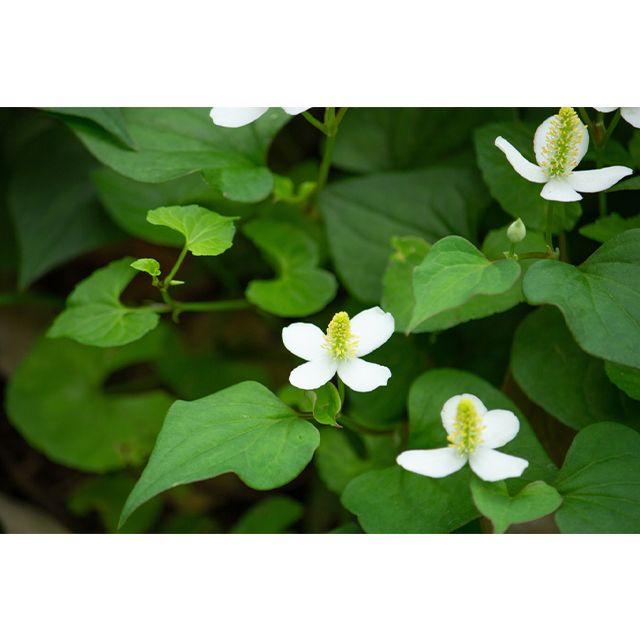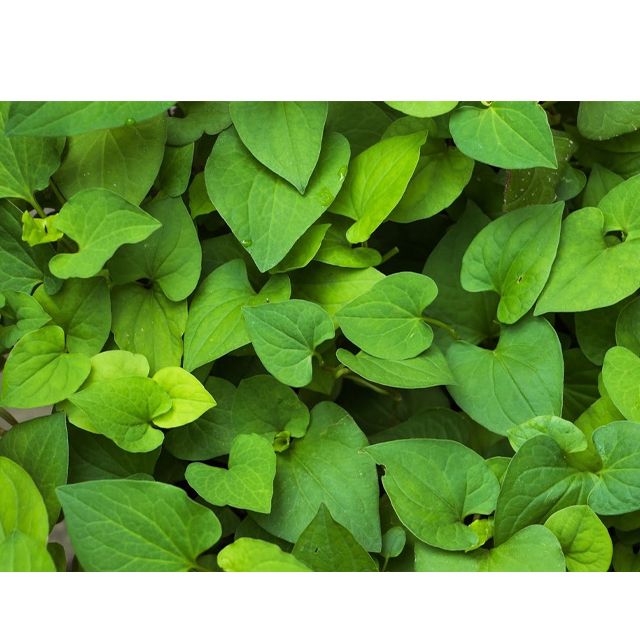FISH MINT
Fish mint (Also known as chameleon plant and “diếp cá” in Vietnamese”) is a herb of Southeast Asian origin. It is a perennial plant, grown for its leave which is to use in culinary and traditional medicine. This plant can grow up to 0.6–1 m in height. The dark green leaves are alternate, blade heart-shaped, about 3 inches long, and nearly as wide.
Fish mint leaves have a distinctive fishy flavor, hence the name, with a slightly sour, metallic tang and a spicy note in it. The same can be said about the plant’s odor, but milder. However, the roots are much more akin to really strong cilantro.
 Passport
Passport
 How to eat
How to eat
Fish mint has long been cultivated for its leaves as a vegetable to use in traditional Asian cuisine, especially in Southeast Asia. In southwestern China, such as the provinces of Yunnan, Guizhou, and Sichuan, the subsidiary roots are also used as vegetables. In Vietnam, it is used a lot in the southern provinces, often used to eat raw leaves with many dishes such as grilled meat, spring rolls vermicelli, spring rolls...
Japan already has technologies to process fish mint into foods such as tea and wine.
 Health benefit
Health benefit
The essential oil in fish mint has the ability to inhibit viruses such as herpes virus (HSV-1), influenza virus, human HIV strain 1 (HIV-1), Staphylococcus aureus, and streptococcus bacteria. hemolytic bacteria, pneumococci, dysentery bacilli, fungi…The plant’s diuretic property is due to quercitrin and inorganic substances contained in fish mint. The solution with 1/10,000 of quercitrin moiety still has a very strong diuretic effect. Isoquercitrin also has a diuretic effect.
In addition, fish mint also has anti-inflammatory effects, enhances immune function, fights cancer, leukemia...
Aside from that, fish mint is used to treat constipation, hemorrhoids, boils, itchy sores, children with measles, pneumonia, eye pain, or red eyes caused by green pus bacilli, enteritis, urinary retention, dysentery, menstruation. erratic.
 Export Overview
Export Overview
In recent years, thanks to the growing demand for healthy and safe agricultural products from overseas markets. Local farmers have seized the opportunity and focused on cultivating fish mint by following Global Gap and VietGap criteria towards export. Thoughout new Vietnamese fish mint has entered the market in some countries such as Japan, China and Malaysia, ...
 What’s FOSACHA
What’s FOSACHA
Currently FOSACHA has Thai basil as one of our main exported products. We work directly with the farms from our supply chain throughout the production process. this includes from planting, harvesting, sorting to grading the top quality of the Thai basil for any potential importers from international markets. Most importantly our Vietnamese Thai basil must be GlobalGAP-compliant, to meet the standards of food hygiene and safety as well as be of clear origin to be traceable. FOSACHA is confident that we will always provide our customers with high-quality products that satisfy global consumers.
If you are looking for a reputable supplier to import high-quality, VietGAP, GlobalGAP compliant Vietnam-grown Thai basil as well as establish a long-term mutually beneficial partnership. please feel free to contact us with the following information for further discussion.
Company: FOSACHA Joint Stock Company
Address: 130 Nguyen Duc Canh Str, Tan Mai Ward, Hoang Mai District, Hanoi, Vietnam
Tel: (+84) 869330380
Website: https://fosacha.com/
Email: info@fosacha.com
 Availability
Availability












